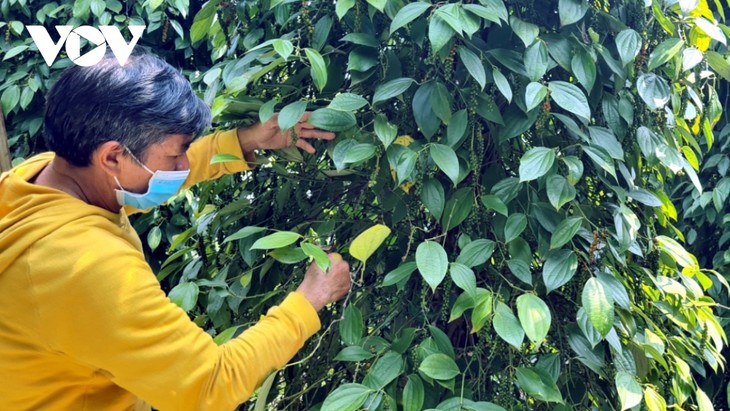(VOVWORLD) - Gia Lai province has 18,000 hectares of pepper growing land, the largest area in the Central Highlands. Local farmers are currently in the main pepper harvest season. Sustainable planting methods have helped growers earn a profit.
 A worker of Nam Yang Agriculture and Service Cooperative A worker of Nam Yang Agriculture and Service Cooperative |
Nguyen Thi Le Thu’s family of hamlet 3 in Dak Doa district, Gia Lai province has set aside 5.5 hectares to grow pepper plants which are now in the harvesting stage. She said under the organic pepper farming model, Thu lets grass grow naturally in the garden to create porosity and keep the soil moist.
Use of chemical fertilizers is minimized, in favor of an organic fertilizer made of soybean residue and coffee husks. Chemical pesticides are replaced by biological products. The cultivation process is chronicled in a daily crop diary.
Purchasing enterprises can make unannounced inspections to randomly pick leaf samples and pepper fruits. If the test samples meet the requirements, the family's pepper product will be purchased at a price 30% higher than in the market place.
Thu said that in this year’s harvest, her orchard has yielded about 3.5 tons per one hectare. Although the productivity is lower than in previous years, her family earned a higher profit because the product was sold at more than 4,800 USD per ton.
“Organic farming method has been chosen to overcome difficulties caused by climate and pandemic-related problems. I am fortunate to have worked with Sơn Hà Spice & Flavorings Company which specializes in exporting pepper to Europe. The method is good for my family, the company, growers, and the environment,” said Thu.
Two years ago, 50 pepper growing households in Nam Yang commune jointly established a group for sustainable safe pepper production and trading. Ngo Van Tien, the group’s leader, said participating farmers can exchange experiences and successful practices in production. They can share and improve techniques and build relationships with organic fertilizer suppliers to have the lowest input prices.
For the output, farmers can select partners to eliminate unnecessary costs caused by intermediaries. Thanks to organic production, the product value is always twice as high as products grown with chemicals. Tien said it’s impossible to change overnight the traditional farming methods. This is a revolution in ways of thinking. If successful, farmers will be less dependent on external factors such as price fluctuations, input costs, and other risks.
Nguyen Tan Cong, President of the Nam Yang Agriculture and Service Cooperative, said that at first it was difficult to mobilize local farmers to join the cooperative, but as soon as they realize the cooperative's products were sold for 150 to 200% higher than the normal prices, they became enthusiastic. The cooperative has worked with two businesses in Ho Chi Minh City to buy all of their products.
Nam Yang Cooperative now has 80 hectares for pepper cultivation, half of which are utilizing organic farming methods to meet export standards set by demanding markets. The remaining area is for mass-production, but chemicals and herbicides are minimized, said Cong.
“Because of the COVID-19 pandemic and price hikes in 2017, 2018 and 2020, we have learned many lessons. Farmers are earning profits from pepper cultivation and intercropping instead of monoculture, and haven’t massively planted any crops as in the past. Both the cooperative and farmers agree on the need to develop sustainable ecological or organic farming,” said Cong.
According to Doan Ngoc Co, Deputy Director of the provincial Department of Agriculture and Rural Development, over the past 2 years though pepper prices have increased to 3.5 USD a kilo, the locals didn’t need to cut down other trees to grow pepper, thus preserving the natural state.
Co said, “All the remaining pepper areas that have applied production methods in standard and sustainable directions, thus greatly reducing damage to crops by pestilent insects. As a result, the productivity and output are stable.”